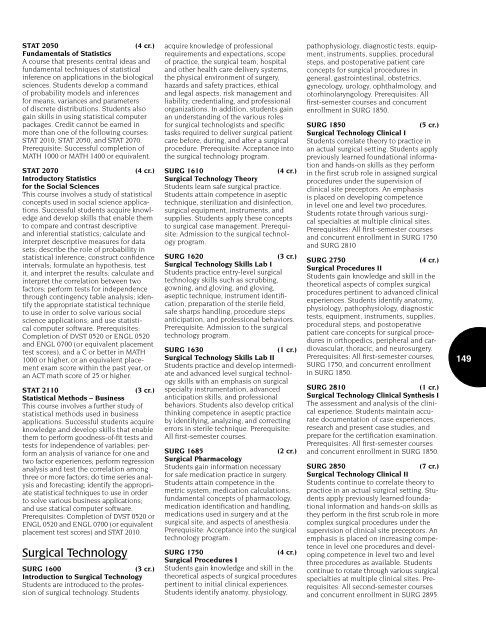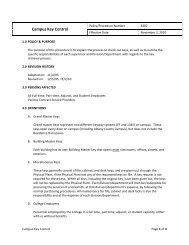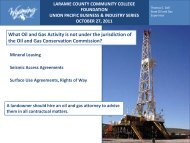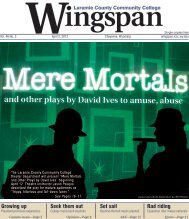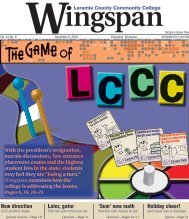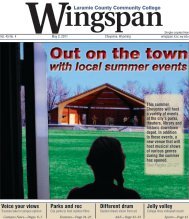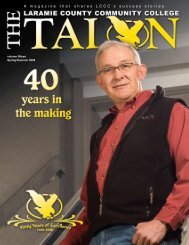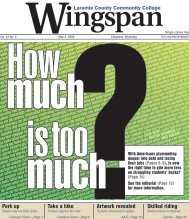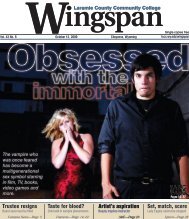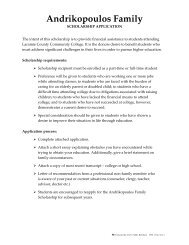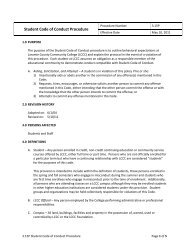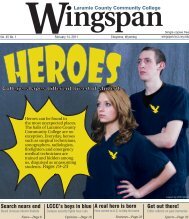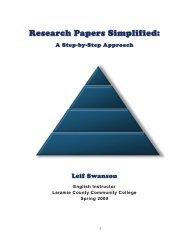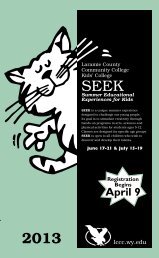LCCC policy - Laramie County Community College
LCCC policy - Laramie County Community College
LCCC policy - Laramie County Community College
You also want an ePaper? Increase the reach of your titles
YUMPU automatically turns print PDFs into web optimized ePapers that Google loves.
STAT 2050<br />
(4 cr.)<br />
Fundamentals of Statistics<br />
A course that presents central ideas and<br />
fundamental techniques of statistical<br />
inference on applications in the biological<br />
sciences. Students develop a command<br />
of probability models and inferences<br />
for means, variances and parameters<br />
of discrete distributions. Students also<br />
gain skills in using statistical computer<br />
packages. Credit cannot be earned in<br />
more than one of the following courses:<br />
STAT 2010, STAT 2050, and STAT 2070.<br />
Prerequisite: Successful completion of<br />
MATH 1000 or MATH 1400 or equivalent.<br />
STAT 2070<br />
(4 cr.)<br />
Introductory Statistics<br />
for the Social Sciences<br />
This course involves a study of statistical<br />
concepts used in social science applications.<br />
Successful students acquire knowledge<br />
and develop skills that enable them<br />
to compare and contrast descriptive<br />
and inferential statistics; calculate and<br />
interpret descriptive measures for data<br />
sets; describe the role of probability in<br />
statistical inference; construct confidence<br />
intervals; formulate an hypothesis, test<br />
it, and interpret the results; calculate and<br />
interpret the correlation between two<br />
factors; perform tests for independence<br />
through contingency table analysis; identify<br />
the appropriate statistical technique<br />
to use in order to solve various social<br />
science applications; and use statistical<br />
computer software. Prerequisites:<br />
Completion of DVST 0520 or ENGL 0520<br />
and ENGL 0700 (or equivalent placement<br />
test scores), and a C or better in MATH<br />
1000 or higher, or an equivalent placement<br />
exam score within the past year, or<br />
an ACT math score of 25 or higher.<br />
STAT 2110<br />
(3 cr.)<br />
Statistical Methods – Business<br />
This course involves a further study of<br />
statistical methods used in business<br />
applications. Successful students acquire<br />
knowledge and develop skills that enable<br />
them to perform goodness-of-fit tests and<br />
tests for independence of variables; perform<br />
an analysis of variance for one and<br />
two factor experiences; perform regression<br />
analysis and test the correlation among<br />
three or more factors; do time series analysis<br />
and forecasting; identify the appropriate<br />
statistical techniques to use in order<br />
to solve various business applications;<br />
and use statical computer software.<br />
Prerequisites: Completion of DVST 0520 or<br />
ENGL 0520 and ENGL 0700 (or equivalent<br />
placement test scores) and STAT 2010.<br />
Surgical Technology<br />
SURG 1600<br />
(3 cr.)<br />
Introduction to Surgical Technology<br />
Students are introduced to the profession<br />
of surgical technology. Students<br />
acquire knowledge of professional<br />
requirements and expectations, scope<br />
of practice, the surgical team, hospital<br />
and other health care delivery systems,<br />
the physical environment of surgery,<br />
hazards and safety practices, ethical<br />
and legal aspects, risk management and<br />
liability, credentialing, and professional<br />
organizations. In addition, students gain<br />
an understanding of the various roles<br />
for surgical technologists and specific<br />
tasks required to deliver surgical patient<br />
care before, during, and after a surgical<br />
procedure. Prerequisite: Acceptance into<br />
the surgical technology program.<br />
SURG 1610<br />
(4 cr.)<br />
Surgical Technology Theory<br />
Students learn safe surgical practice.<br />
Students attain competence in aseptic<br />
technique, sterilization and disinfection,<br />
surgical equipment, instruments, and<br />
supplies. Students apply these concepts<br />
to surgical case management. Prerequisite:<br />
Admission to the surgical technology<br />
program.<br />
SURG 1620<br />
(3 cr.)<br />
Surgical Technology Skills Lab I<br />
Students practice entry-level surgical<br />
technology skills such as scrubbing,<br />
gowning, and gloving, and gloving,<br />
aseptic technique, instrument identification,<br />
preparation of the sterile field,<br />
safe sharps handling, procedure steps<br />
anticipation, and professional behaviors.<br />
Prerequisite: Admission to the surgical<br />
technology program.<br />
SURG 1630<br />
(1 cr.)<br />
Surgical Technology Skills Lab II<br />
Students practice and develop intermediate<br />
and advanced level surgical technology<br />
skills with an emphasis on surgical<br />
specialty instrumentation, advanced<br />
anticipation skills, and professional<br />
behaviors. Students also develop critical<br />
thinking competence in aseptic practice<br />
by identifying, analyzing, and correcting<br />
errors in sterile technique. Prerequisite:<br />
All first-semester courses.<br />
SURG 1685<br />
(2 cr.)<br />
Surgical Pharmacology<br />
Students gain information necessary<br />
for safe medication practice in surgery.<br />
Students attain competence in the<br />
metric system, medication calculations,<br />
fundamental concepts of pharmacology,<br />
medication identification and handling,<br />
medications used in surgery and at the<br />
surgical site, and aspects of anesthesia.<br />
Prerequisite: Acceptance into the surgical<br />
technology program.<br />
SURG 1750<br />
(4 cr.)<br />
Surgical Procedures I<br />
Students gain knowledge and skill in the<br />
theoretical aspects of surgical procedures<br />
pertinent to initial clinical experiences.<br />
Students identify anatomy, physiology,<br />
pathophysiology, diagnostic tests, equipment,<br />
instruments, supplies, procedural<br />
steps, and postoperative patient care<br />
concepts for surgical procedures in<br />
general, gastrointestinal, obstetrics,<br />
gynecology, urology, ophthalmology, and<br />
otorhinolaryngology. Prerequisites: All<br />
first-semester courses and concurrent<br />
enrollment in SURG 1850.<br />
SURG 1850<br />
(5 cr.)<br />
Surgical Technology Clinical I<br />
Students correlate theory to practice in<br />
an actual surgical setting. Students apply<br />
previously learned foundational information<br />
and hands-on skills as they perform<br />
in the first scrub role in assigned surgical<br />
procedures under the supervision of<br />
clinical site preceptors. An emphasis<br />
is placed on developing competence<br />
in level one and level two procedures.<br />
Students rotate through various surgical<br />
specialties at multiple clinical sites.<br />
Prerequisites: All first-semester courses<br />
and concurrent enrollment in SURG 1750<br />
and SURG 2810<br />
SURG 2750<br />
(4 cr.)<br />
Surgical Procedures II<br />
Students gain knowledge and skill in the<br />
theoretical aspects of complex surgical<br />
procedures pertinent to advanced clinical<br />
experiences. Students identify anatomy,<br />
physiology, pathophysiology, diagnostic<br />
tests, equipment, instruments, supplies,<br />
procedural steps, and postoperative<br />
patient care concepts for surgical procedures<br />
in orthopedics, peripheral and cardiovascular,<br />
thoracic, and neurosurgery.<br />
Prerequisites: All first-semester courses,<br />
SURG 1750, and concurrent enrollment<br />
in SURG 1850.<br />
SURG 2810<br />
(1 cr.)<br />
Surgical Technology Clinical Synthesis I<br />
The assessment and analysis of the clinical<br />
experience. Students maintain accurate<br />
documentation of case experiences,<br />
research and present case studies, and<br />
prepare for the certification examination.<br />
Prerequisites: All first-semester courses<br />
and concurrent enrollment in SURG 1850.<br />
SURG 2850<br />
(7 cr.)<br />
Surgical Technology Clinical II<br />
Students continue to correlate theory to<br />
practice in an actual surgical setting. Students<br />
apply previously learned foundational<br />
information and hands-on skills as<br />
they perform in the first scrub role in more<br />
complex surgical procedures under the<br />
supervision of clinical site preceptors. An<br />
emphasis is placed on increasing competence<br />
in level one procedures and developing<br />
competence in level two and level<br />
three procedures as available. Students<br />
continue to rotate through various surgical<br />
specialties at multiple clinical sites. Prerequisites:<br />
All second-semester courses<br />
and concurrent enrollment in SURG 2895.<br />
149


